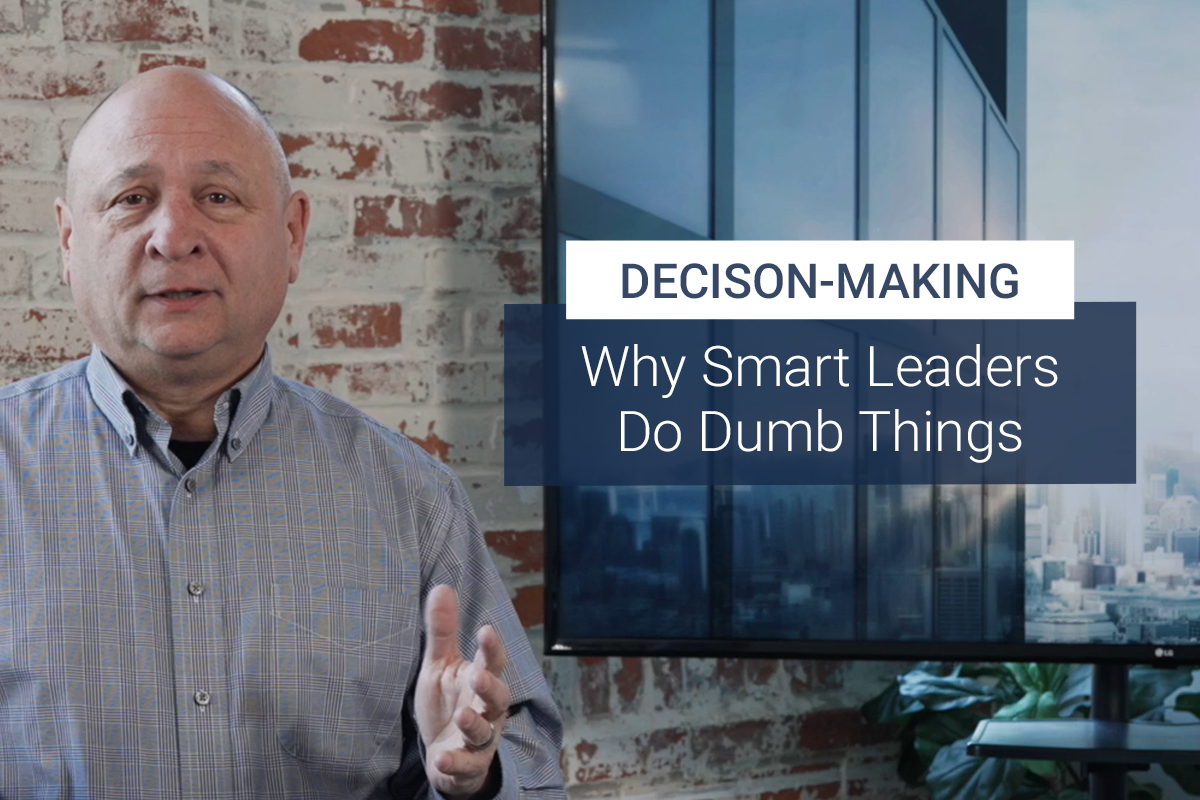My daughter showed me a video of a man who bought a flat-screen TV so large that he could not fit it in the trunk of his car. Then he tried to put it in the back seat, but that didn’t work either. Finally, he put it on top of his trunk and drove out of the parking lot without doing anything to secure it! This is an example of a smart person doing a dumb thing.
There are a lot of examples of people who are perhaps smart, but not smart all the time. Why do smart leaders do dumb things? The short answer is simple. Because they are human.
Albert Einstein said, “Only two things are infinite, the universe and human stupidity, and I'm not sure about the former.”
Here are five specific reasons smart leaders sometimes do dumb things.
1. Pride
Years ago, researcher Mortimer Feinberg wrote a book about Why Smart People Do Dumb Things. He found that the number one reason was pride. Then Jim Collins wrote a book called How the Mighty Fall about why organizations go from success to failure. Again, the number one reason was pride.
Pride grows out of success, and when a person becomes successful, they sometimes are no longer willing to listen and learn from others. This can lead to overconfidence and then to pride. A high level of intelligence, a track record of success, and a close group of associates telling you how great you are only reinforce the belief. Thousands of years of history have proven Proverbs correct: “Pride leads to destruction.”
2. Defensiveness
When leaders are threatened by input from others, defensive responses take over. These responses stop a leader from learning and result in bad decisions. Here are five of the most common defensive routines.
ATTACK the person
DENY it happened
BLOW UP at the person
BLAME the person (making it their fault)
HIDE from the person (withdrawing or avoiding them)
3. Minimal Feedback
Bob Iger was the CEO of The Walt Disney Company during some of its most rapid growth. After he stepped away, the new CEO didn’t succeed, so they asked Bob to come back. When he went back, he said one thing he was going to do differently was to listen more. He realized that, because of his success, there were times when he was overconfident and dismissive of feedback from others, and he was not going to do that again. Here are some important reminders about feedback:
Leading without feedback is like driving in fog – very risky.
Feedback warns us of blind spots.
Feedback provides alternative perspectives.
Feedback improves the odds of making good choices.
4. Anger
Anger can make very intelligent people very dumb. This could include blowing up at others, displaying rage, threatening others, or losing self-control. These types of responses cause other people to keep their distance, no longer want to give us feedback, and become anxious and fearful of us. If you want to be a smart leader who does dumb things, respond in anger because anger hinders learning.
“Whatever is begun in anger ends in shame.” – Benjamin Franklin
5. Groupthink
The final thing that causes smart leaders to do dumb things is groupthink, or “collective dumbness.” This takes place when:
Leaders surround themselves with people who think just like them and will tell them what they want to hear rather than what they need to hear.
Conformity and harmony are valued over effectiveness.
Group members fear punishment if they disagree.
Groupthink is commonly found even in groups made up of very smart people. When a group does this, learning will be hindered, and they will be more likely to make bad choices.
What To Do About It
If you want to be a smart leader who does smart things, focus on these three things:
Be humble.
Seek advice.
Listen.
If you want to be a smart leader making smarter decisions, contact us to learn how our experienced coaches can assist you.
Jay Desko is the President & CEO of The Center Consulting Group and brings experience in the areas of organizational assessment, leadership coaching, decision-making, and strategic questioning. Jay’s degrees include an M.Ed. in Instructional Systems Design from Pennsylvania State University and a Ph.D. in Organizational Behavior and Leadership from The Union Institute.




![Preparing for the (Expectedly) Unexpected [VIDEO]](https://images.squarespace-cdn.com/content/v1/571fc0ea1d07c0fd6d72c167/e4193bcf-29f7-46c2-be12-9116791d40cf/unexpected+blog.png)
![Fundraising: How to Raise Funds for Your Nonprofit [VIDEO]](https://images.squarespace-cdn.com/content/v1/571fc0ea1d07c0fd6d72c167/1757619882819-6OARWR0QU11M7LA0ABYL/fundraising+blog.png)
![Culture: 5 Traits That Set Healthy Churches & Their Leaders Apart [VIDEO]](https://images.squarespace-cdn.com/content/v1/571fc0ea1d07c0fd6d72c167/1755633039402-KVJFNJWG0RKBCMLS5FNB/healthy+blog.png)